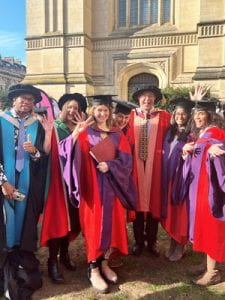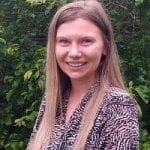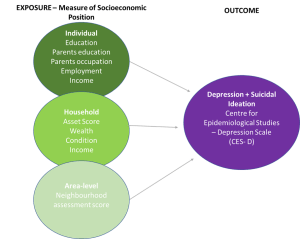 Huge congratulations to SASH PhD students Dr Lizzy Winstone, Dr Prianka Padmanathan and Dr Jacks Bennet, who graduated in sunny Bristol today.
Huge congratulations to SASH PhD students Dr Lizzy Winstone, Dr Prianka Padmanathan and Dr Jacks Bennet, who graduated in sunny Bristol today.
We are very proud of you all and excited to see what you do next.

Bristol Suicide and Self-harm Research Group
SASH Bristol conducts suicide and self-harm prevention research
This qualitative study, published in JIMR mental health explores how people who self-harm engage with and evaluate web-based lived experience content. Four focus groups were conducted with 13 people with recent self-harm experience. Five themes were generated: stories of recovery from self-harm and their emotional impact, impact on self-help and help-seeking behaviours, identifying with the narrator, authenticity, and language and stereotyping.
The findings have implications for organizations publishing lived experience content and for community guidelines and moderators of web-based forums in which users share their stories. These include the need to consider the narrator’s age and the relatability and authenticity of their journey and the need to avoid using stigmatizing language. You can access the full paper here
Winstone L, Mars B, Ferrar J, Moran P, Penton-Voak I, Grace L, Biddle L. Investigating How People Who Self-harm Evaluate Web-Based Lived Experience Stories: Focus Group Study. JMIR Ment Health 2023;10:e43840
doi: 10.2196/43840
 In this podcast from the Association for Child and Adolescent Mental Health (ACAMH), SASH researcher Lizzy Winstone talks about some of the research from her PhD looking at the relationship between adolescent social media use and mental health
In this podcast from the Association for Child and Adolescent Mental Health (ACAMH), SASH researcher Lizzy Winstone talks about some of the research from her PhD looking at the relationship between adolescent social media use and mental health
The focus of this podcast is on her JCCP Advances paper ‘Adolescent social media user types and their mental health and well-being, results from a longitudinal survey of 13 to 14-year-olds in the United Kingdom’ (doi.org/10.1002/jcv2.12071).
Lizzy sets the scene by detailing a summary of the paper and sharing insight into the methodology used for the research.
In previous studies, distinctions are made between active and passive social media. Lizzy explains why her paper suggests that this distinction may be too simplistic and comments on the four classes of social media users identified in her paper – high communicators, moderate communicators, broadcasters, and minimal users – including how each of these different groups behave.
Lizzy then highlights the key findings from the paper and provides further commentary on her finding that moderate social media screen time was beneficial to well-being, in comparison to no use at all.
Lizzy also discusses if there were any gender differences in her research, plus what the implications are of her findings overall for Child and Adolescent Mental Health professionals.
You can also access an 8 minute video abstract of Lizzy discussing the paper here
 Congratulations to Lizzy Winstone whose paper ‘Adolescent social media user types and their mental health and well-being, results from a longitudinal survey of 13 to 14-year-olds in the United Kingdom’ was among the top 10 most downloaded papers in JCPP Advances in 2022.
Congratulations to Lizzy Winstone whose paper ‘Adolescent social media user types and their mental health and well-being, results from a longitudinal survey of 13 to 14-year-olds in the United Kingdom’ was among the top 10 most downloaded papers in JCPP Advances in 2022.
Lizzy’s paper is the first to identify social media user types in early adolescence in terms of proclivity for different online activities. It contributes valuable new knowledge to the field and has important implications for adolescent mental health. You can access the paper here
 Congratulations to Lizzy Winstone who was highly commended for the Digital Innovation Award for Best Research on Digital Impact at the 2022 ACAMH awards. Lizzy was recognised for her research on social media and mental health in young people, which was the focus of her PhD. Lizzy has translated her research findings into a set of accessible recommendations for young people to help them use social media in a way that best supports their mental health. The video has been shared with schools, parents, public health practitioners, third sector organisations, and clinicians and is available on YouTube. You can access it here
Congratulations to Lizzy Winstone who was highly commended for the Digital Innovation Award for Best Research on Digital Impact at the 2022 ACAMH awards. Lizzy was recognised for her research on social media and mental health in young people, which was the focus of her PhD. Lizzy has translated her research findings into a set of accessible recommendations for young people to help them use social media in a way that best supports their mental health. The video has been shared with schools, parents, public health practitioners, third sector organisations, and clinicians and is available on YouTube. You can access it here
 Dr Linton advised on a new Channel 4 reality show ‘A simpler life’ which aimed to examine the impact of simpler living on life satisfaction, health and wellbeing cut off from the modern world. The volunteers had to live without technology, heating, or electricity and received guidance from a Pennsylvania Amish family from Ohio on how to grow crops, milk goats and cows, and raise chickens.
Dr Linton advised on a new Channel 4 reality show ‘A simpler life’ which aimed to examine the impact of simpler living on life satisfaction, health and wellbeing cut off from the modern world. The volunteers had to live without technology, heating, or electricity and received guidance from a Pennsylvania Amish family from Ohio on how to grow crops, milk goats and cows, and raise chickens.
Dr Myles-Jay Linton said: “The pandemic has made lots of us reflect on our busy 21st-century lives, exploring the pros and cons of a stripped back lifestyle will hopefully prompt people to really think about how living a simpler life could lead to greater life satisfaction. With the data collected, we were able to unpick how personality characteristics and core values explained the drastically different experiences of community members on the farm.”
You can watch the series on Channel 4
Co-leads Drs Becky Mars and Duleeka Knipe have recorded short spotlight talks for the International Association for Suicide Research which provide an overview of the problem of suicide globally. Watch the short videos here:
 In this podcast from the Association for Child and Adolescent Mental Health (ACAMH), Dr Abigail Russell discusses suicide and self-harm with freelance journalist Jo Carlowe. Abigail discusses her paper on inflammation and self-harm, its findings and implications moving forward. As well as the cohort study (ALSPAC), to school interventions and creating change through national dialogue.
In this podcast from the Association for Child and Adolescent Mental Health (ACAMH), Dr Abigail Russell discusses suicide and self-harm with freelance journalist Jo Carlowe. Abigail discusses her paper on inflammation and self-harm, its findings and implications moving forward. As well as the cohort study (ALSPAC), to school interventions and creating change through national dialogue.
Abby says “The research over the last 30 years, has shown that facing bad or adverse experiences early in life leads to people being at a higher risk of self-harm or attempting to end their life, but we don’t yet understand why this happens. What we do know is that early experiences can impact on the way the body works, changing hormones, influencing chemicals around our genes and activating the immune system, for example. These impacts on the body might increase our risk of self-harm”
To read more about the research you can access the full paper here
Russell AE, Heron J, Gunnell D, Ford T, Hemani G, Joinson C, Moran P, Relton C, Suderman M, Mars B. Pathways between early-life adversity and adolescent self-harm: the mediating role of inflammation in the Avon Longitudinal Study of Parents and Children. J Child Psychol Psychiatry. 2019 Oct;60(10):1094-1103. doi: 10.1111/jcpp.13100.
 In this blog post from the Association for Child and Adolescent Mental Health (ACAMH), Dr Abigail Russell talks about research into adverse childhood experiences or ‘ACEs’ and what we know about the relationship between ACES, mental health and self-harm. Abby also discusses her ongoing research at the University of Bristol (PI Dr Becky Mars), which is investigating potential biological mechanisms linking ACEs and self-harm. These include inflammation, pubertal timing and DNA methylation.
In this blog post from the Association for Child and Adolescent Mental Health (ACAMH), Dr Abigail Russell talks about research into adverse childhood experiences or ‘ACEs’ and what we know about the relationship between ACES, mental health and self-harm. Abby also discusses her ongoing research at the University of Bristol (PI Dr Becky Mars), which is investigating potential biological mechanisms linking ACEs and self-harm. These include inflammation, pubertal timing and DNA methylation.
 In this blog, Lucy Barrass talks about her plans for her PhD which is using data from the Philippines to improve our knowledge of what contributes to poor mental health in this country, focusing on socioeconomic position. Lucy also reflects on her experiences as a new PhD student at Bristol University.
In this blog, Lucy Barrass talks about her plans for her PhD which is using data from the Philippines to improve our knowledge of what contributes to poor mental health in this country, focusing on socioeconomic position. Lucy also reflects on her experiences as a new PhD student at Bristol University.
Mental health research is severely lacking in low and middle income countries (LMICs). The burden of disease is high, but the evidence surrounding it is low. Evidence in high income countries (HIC) may not be generalizable to LMICs due to differences in cultural and societal exposures. Studies from LMICs are mainly performed at one time point or they collect data retrospectively, making it difficult to determine if the exposure came before the outcome; very little evidence is from birth cohort data that can be used to explore causality and early life exposures. A life course approach allows early life exposures to be analysed in synergy with later life exposures.
I’m Lucy Barrass and I am a first year PhD student at Bristol. I previously studied and worked at Newcastle University before I moved to Bristol to pursue this PhD, motivated by an opportunity to improve public health, and develop skills in global health and epidemiology. As part of a GW4 PhD I plan to use data from a unique dataset in the Philippines to improve our knowledge of what contributes to poor mental health in this country. I will use data from the Cebu Longitudinal Health and Nutrition Survey (CLHNS), a birth cohort situated in a metropolitan area in the Philippines. The CLHNS was first conducted in 1983, collecting data about pregnant women and their new-born children. The study has collected data between the ages of 0 to 35, allowing for a comprehensive longitudinal analysis exploring early and later life exposures. This PhD will use the CLHNS to provide support of the associations between socioeconomic position and mental health in a LMIC. The study aims to identify socioeconomic risk factors for depression and suicidal thoughts, that are contextually relevant and can be used as measures to design interventions. Despite the existence of the CLHNS, there is very little evidence on mental health in the Philippines, particularly on risk factors across the life course and exploring socioeconomic position.
The below image shows some variables which will be used in my analysis, that are present in, or can be constructed from, the CHLNS.
I am still considering comparing the results from the Filipino data to other birth cohorts that measure depression/suicidal thoughts in other LMICs, such as the Birth to Twenty in South Africa. It may provide an added dimension to the results and potentially highlight differences that occur between different populations.
Having been a PhD student for a few months now, I am starting to settle into PhD life and can begin to think about goals and things I hope to achieve whilst I complete it. So far, I am really enjoying it, and I’m looking forward to progressing as a researcher in the coming months and years! I am particularly excited to learn new statistical methods to explore the longitudinal data as I haven’t previously used this type of data and I think this will be really beneficial for my career. Equally, hopefully being able to present my work at international conferences will be something I would love to work towards. I am also excited to be given the opportunity to visit the Philippines to further understand the dataset, both methodologically and culturally and ensure my findings are utilised. If you are interested in hearing more about my PhD, please do get in contact with me!